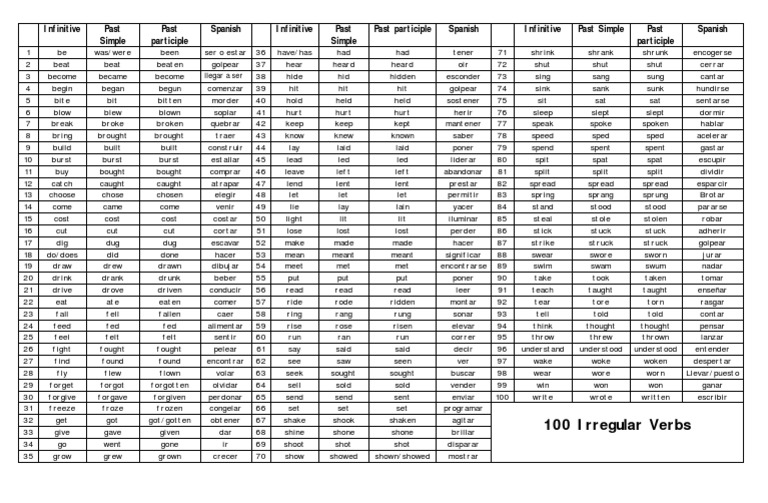100 Examples Of Regular Verbs
For information specific to the English language, see. A regular verb is any whose follows the typical pattern, or one of the typical patterns, of the language to which it belongs. A verb whose conjugation follows a different pattern is called an irregular verb. (This is one instance of the distinction between, which can also apply to other word classes, such as nouns and adjectives.) In, for example, verbs such as play, enter, and like are regular since they form their inflected parts by adding the typical endings -s, -ing and -ed to give forms such as plays, entering, and liked.
Improve your English by learning and memorizing the common irregular verbs in English below. If you have any questions about studying English, please.
On the other hand, verbs such as drink, hit and have are irregular since some of their parts are not made according to the typical pattern: drank and drunk (not 'drinked'); hit (as and, not 'hitted') and has and had (not 'haves' and 'haved'). The classification of verbs as regular or irregular is to some extent a subjective matter. If some conjugational in a language is followed by a limited number of verbs, or it requires the specification of more than one (as with the ), views may differ as to whether the verbs in question should be considered irregular. Most inflectional irregularities arise as a result of series of fairly uniform historical changes so forms that appear to be irregular from a (contemporary) point of view may be seen as following more regular patterns when the verbs are analyzed from a diachronic viewpoint.: The Ingredients of Language, 1999.

Hacker, Diana (2017). The Bedford Handbook. Curriculum solutions. External links Look up in Wiktionary, the free dictionary. Germanic languages. English Irregular Verb Search. All the irregular verbs of the English language.
Conjugation, pronunciation, translation and examples. Practice online exercises with the irregular verbs and examples. Romance languages.
includes a list of irregular Catalan verbs. Other Indo-European languages.
An English verb can be regular or irregular. Regular verbs form their past and past participle forms by adding –ed.

Examples are given below. Walk – walked – walked Dance – danced – danced Paint – painted – painted Work – worked – worked Irregular verbs form their past and past participle forms in different ways.
100 Examples Of Regular Verbs Cooking
There are mainly three types of irregular verbs. Verbs in which all the three forms are the same (e.g. Put – put – put) Verbs in which two of the three forms are the same (e.g.
100 Examples Of Regular Verbs Cooking
Sit – sat – sat) Verbs in which all three forms are different (e.g. Drink – drank – drunk) Some verbs can be both regular and irregular.